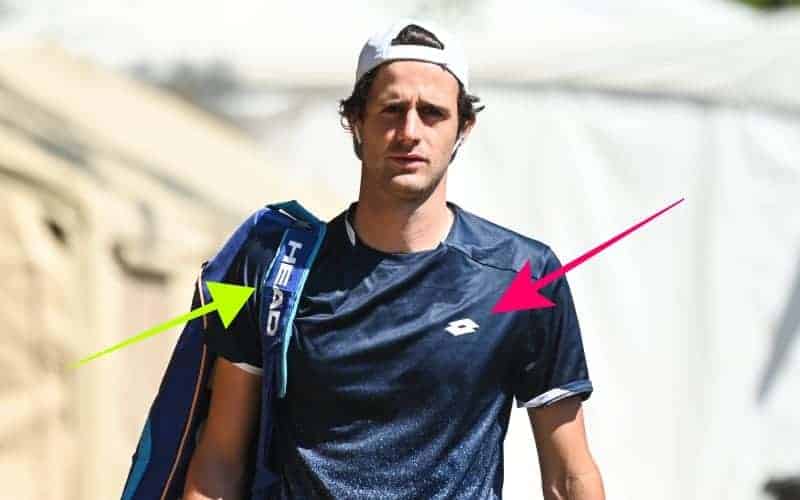A young player with ambitions of playing tennis at a high level will incur a lot of costs. They will need a supply of rackets, clothing, shoes, and string. Entering and traveling to tournaments can be very costly. On top of all of this comes the cost of the player’s training program, including, coaching, fitness, and psychology, as well as, in many cases, general schooling.
Together, these costs can amount to over $100,000 per year, which for most families is unaffordable. National governing bodies will often support their favored players, but even they will rarely cover everything. Private sponsorship is therefore crucial in allowing players the opportunity to play and progress. In this article, we will look at how they can get access to this very necessary additional funding.
A junior player who wants sponsorship needs to be performing well and playing at the big events, where the sponsors will get maximum exposure. Provided a junior player is performing at a high level, the first step is to contact the brand through their website or phone number.
There are many levels of possible sponsorship, ranging from discounted equipment to substantial cash payments, and virtually all of the big-name equipment and clothing suppliers will offer something to the most promising juniors, although local brands can be a good option too.
The Importance Of Visibility & Good Rankings
To understand this, think about why a company might want to sponsor someone. Essentially, they will want their brand to be associated with high performance and success. If there are some players who regularly perform well at the most prestigious tournaments, and ideally display a certain amount of charisma, these are the ones whom companies would like to promote their brand. They want their products associated with success in order that more people will want to buy them. Good players who play few events will not normally be attractive to major sponsors.
In recent years, another element of ‘visibility’ has become important to potential sponsors. If a player is an expert in their use of social media, and has built a significant following from posts about their tennis, this means that they are in an excellent position to promote a sponsor’s business.
Receiving Free Gear Sponsorships vs Getting Paid
Sponsorship can come in many forms. A promising player with a good ranking might be offered essential equipment like an annual supply of rackets, string, bags, and shoes by a manufacturer. This type of deal can save well over $1,000 per year, so it is well worth having. Slightly higher profile players might get extras like a free stringing service. Similarly, a clothing manufacturer might offer a selection of the latest match kits each year.
Certain juniors, however, have something extra to offer sponsors. This may be truly exceptional performance, a huge social media following, or simply being the best player based in a country that is an important target market for the company in question. In these cases, cash payments will also be made to the player to tie them to the sponsor’s brand.
Obviously the latter type of contract is the holy grail for young players of limited financial means, but most will need to ‘make do’ with free or discounted equipment.
How To Get Sponsored By Babolat, Wilson, Head Or Yonex
Each manufacturer will have a different sponsorship budget. The larger this is, the more frequent and generous will be the offers of sponsorship. In addition, some will welcome approaches from players or their parents, and others will not.
Babolat is a company that is usually keen to sponsor players. They suggest that you approach them by e-mail initially, setting out your results and rankings, your training center and coaching team, and include videos of yourself in action. They offer international and local deals to players at different stages.
Wilson offers sponsorship through their ‘Select Team’, for which you can apply via their website. Being selected for this entitles you to discounted prices on rackets and other equipment.
Head is fairly vague about what they offer, probably due to a wish to offer different deals to different players. They invite young players to show that they are the ‘next Novak’ by submitting a video of themselves in action. The winners of this competition become part of ‘Team Head’, getting equipment and some time at a leading academy.
Yonex takes a more traditional approach, offering ‘top juniors’ the chance to apply for sponsorship by filling in a form, including details of their ranking and achievements, on the company website.
How To Get Sponsored By Adidas, Nike or Lacoste
To obtain sponsorship from Adidas, players need to write to the Sports Marketing department at their head office in Germany (address on their website) detailing their accomplishments and plans, and setting out why they need and deserve sponsorship.
Nike has traditionally offered some very generous sponsorship deals to young players, but their website emphasises that it is very much a case of ‘don’t call us, we’ll call you’. They aim to identify promising players themselves, and do not consider unsolicited sponsorship requests.
Lacoste has traditionally been extremely selective about the players they sponsor, so that individual sponsorship from them is unlikely unless you are near the top of the world rankings. Nonetheless, they do sponsor some inner-city tennis programs which may be worth trying out for if you are a less experienced player.
Reaching Out To Local Brands
Parents or coaches can make use of their connections to encourage local companies to support players in return for publicity. A player who is just starting to succeed at national or international level might find this an excellent means of gaining additional financial support. Look out for companies whose owners are known to be tennis enthusiasts and try to get them interested in the benefits of sponsorship.
Final Thoughts
Sponsorship is essential in helping ambitious players to do what they need to do to succeed. It can be obtained from many sources, so, even if you are not yet high in the world rankings, keep searching and asking, and you may eventually get some crucial assistance.






